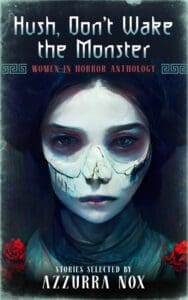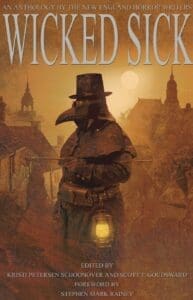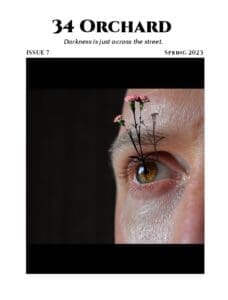WiHM 2023: Kristi Petersen Schoonover from 34 Orchard
Kristi Petersen Schoonover from 34 Orchard
By Angelique Fawns
All is not dark in the world of Kristi Petersen Schoonover. Though this prolific creator in the world of horror publishes a “literary journal that delights in exploring what haunts us all,” her life has been full of positive happenings. She’s had several short stories of her own recently published, including “Let the Rain Settle It” in Hush, Don’t Wake the Monster, Stories Inspired by Stephen King and “When the Ghost Apples Blossom” in Monstorm: A Charity Anthology of Horror (100 percent of proceeds go to a food bank in the area that Hurricane Ian affected). She’s the editor for an anthology titled Wicked Sick, due to be released in April, for the New England Horror Writers, with a Foreword written by Stephen Mark Rainey. Finally, she’s been commissioned to write the screenplay for the second film in a horror movie franchise. In the Candlewood series, Candlewood: Jerusalem will focus on the urban legends surrounding a drowned town under the lake.

Kristi Petersen Schoonover is one of those rare editors who takes the time to mentor new writers, and she has been instrumental in helping me sell several of my stories. I’ve submitted many times to her market, and even if she hasn’t bought a story, she has given me hints and edits that helped make them saleable. I’m thrilled to announce I finally wrote a story she accepted, and “The Unidentified Flying Object” will be appearing in a future issue of 34 Orchard.
I sat down with Schoonover for a catch-up.
AF: You have many irons in the flames of the horror world right now. Short stories, anthologies, editing, and screenwriting! Which is your favorite to create and why?
KPS: Short stories are still, and will always be, my personal jam—my dad started reading me high-school and college-level stories when I was four, so those have always been my first love (don’t know if the best idea was “The Monkey’s Paw,” “Leiningen vs. the Ants” and a book of horror stories set in the Arctic right out of the gate—no wonder I like dark things)! I started reading on my own really early, but when he handed me my first novel (it was a Hardy Boys book, but I don’t recall which one), I didn’t understand the chapters had to be read in order, because I was so used to anthologies. But why I like short stories the best is because I am completely immersed in a world—and I can go complete immersion, because it’s for a short period of time, relatively speaking. I can disappear from reality completely and really obsess, because I can afford to stop my life for a week or two (that’s about how long it takes for a first draft for me). Longer pieces aren’t my best suit because I just can’t stay in the world for that long—life interrupts, and that’s just not as much fun.
I thought screenwriting would be difficult for me, but it’s really only turned out to be the formatting that’s the tough part. It’s just being aware that everything has to be communicated in either dialogue or imagery, including the character’s internal emotions (which, in large part, is left up to the actors). This has been an exciting journey so far, but truth be told—I’ve always started my short stories by writing bits of dialogue first anyway. It’s just that the pieces around it are a bit different.

AF: What can readers expect from your upcoming anthology Wicked Sick?
KPS: Wicked Sick is the 9th in the New England Horror Writers anthology series, and the organization chose the theme. Scott T. Goudsward—the co-editor—and I were really looking for stories and poems that weren’t only well written, but that also had an emotional bite, and for pieces that were intimate and spoke to the truth of what it’s like to live with illness, or be affected by it when it hits those close to you: we wanted readers to feel it. The pieces are a mix of speculative and real, noir and literary, and focus not just on physical illness but on emotional and mental as well—there’s something for every reader. We were honored that the awesome Stephen Mark Rainey—author of many well-known books and collections and editor of Deathrealms magazine for over a decade—agreed to write the Foreword, and what he wrote was amazing—and cover artist Mikio Murakami really nailed the vibe we were looking for. These aren’t your typical “sickness” or “plague” stories (in fact, there’s not one “plague” story in the bunch, actually), and those who love what they find in the pages of 34 Orchard are going to be thrilled with this. It’s due out in late April. Here’s our ToC:
They Come at Night—Gregory Bastianelli
The Cancer Ward at Midnight—L.L. Soares
Will’s Theory of Free-Floating Fat—Peter N. Dudar
Worry Wart—Kurt Newton
Toad in the Hole—Gevera Bert Piedmont
Moonsickness—Jenna Moquin
Irish Wake—Mike Deady
Happy Valley—Howard Odentz
Exorcising Attention Deficit Hyperactive Demons Requires an Order of Operations—Trisha J. Wooldridge
Author’s Note—Rob Smales
Body Work—Nancy Brewka-Clark
House of Tupper—Meg Smith
Eternal Prison—Timothy P. Flynn
Ghost Trains—Tom Deady
The Tall People—Catherine Grant
The Cancer Eaters—K.H. Vaughan
AF: How did you get involved in the Candlewood Horror Movie Franchise?
KPS: I grew up on Candlewood Lake—we had a beach for our neighborhood, there was skating in winter, and boating, and swimming—and it was pretty much the every day fabric of life. Depending on what town you’re from, there were different “legends” that grew up around the lake—mostly cautionary tales, probably to keep us unsupervised kids (I’m a GenXer) in check. I compiled a few of these legends in 2016, and put them out on the web, and they were reprinted in at least one print book. In 2017, I wrote a short story called “Rightfully Mine” that was based on one of these legends—the one in which people who didn’t want to “sell” their property to the company who was flooding the town to create the lake, so they chained themselves to their porches and drowned (please note, there is NO basis in fact that anyone ever did this—this was a story that was told to us as children back in the 1970s) and it was published in Sanitarium Magazine. Then, my husband and Nathan and I took that legend and built a treatment around it as a proposed television series. It was circulated around a little bit, but never went anywhere, so I wrote the whole outline for a novel called Lake Rites.
Fast forward to 2021, and someone who also grew up in my hometown, Myke Fuhrman, had teamed up with Victoria Flores and written a screenplay about other legends involving our area. I got involved as an extra on the film, and in November, was asked to write a treatment for the second film—which Nathan and I pulled and revamped from a television series into a single feature. So that’s how it happened. All by chance.
AF: What is the difference in writing for print versus screen? How did you learn the skill?
KPS: I’ve been told that my work is “cinematic,” in a way—which means, I guess, that readers can visualize my stories easily. So there really wasn’t much of an adjustment; it literally comes down to describing an image or scene in a very literal way (“on the floor there is XXX”) rather than making a more complicated rendering and connecting it to an internal narrative. For me, it was just a matter of learning to work with declarative statements.

AF: You are also the publisher of a dark speculative zine, 34 Orchard. How do you choose the themes for each issue?
KPS: A themed anthology—such as storms, or ghost stories by the sea, or music, or the 1980s, or what-have-you—is a little bit different, because its goal is to feature and explore a specific subject. In contrast, a general publication, like 34O, might have the goal of anything and everything within or without a certain genre that works with its “vibe.” I was told by the late speculative fiction writer and Ezra Pound scholar Daniel Pearlman—who was my mentor for many years—that you never choose a theme for a general publication; just buy what calls to you, and a natural theme linking the pieces together will emerge. That’s why we don’t officially have, or announce, “themes” at 34O. I might have one or two pieces ahead of a call, and think, ‘oh! It might be shaping up to be THIS theme!’ but then many times, it changes. So I just choose following my heart’s desire, and then decipher the subtext threading through the pieces. It involves a lot of close and analytical reading—which is something I love—but basically, the collective work itself tells me what it wants to say. It’s a lot more work, but it’s always worth it in the end.
AF: Have you seen growth in submissions of a certain type of story? What would you like to see more of?
KPS: I haven’t, really—we get a pretty awesome mix of all types of genres, and I’m open to just about anything; it just has to fit our emotionally visceral vibe. It’s difficult to find third-person stories that work for us, so although I’ve been fortunate to get enough to keep balanced issues so far, I’d like to see more of those. Also? I’d really love more submissions from writers in Indonesia, the Philippines, Japan, and other countries in that corner of the world, as well as from South America. We’ve gotten some really great work from all of those nations, but none that’s been a match with us yet.
AF: If you could give authors one piece of advice for success in the short story world, what would it be?
KPS: Read a lot of quality short stories, in all genres, and understand that’s it’s a different form than novels—the shorter the form, the harder it is to make sure everything significant is included. Write what you feel, and emotionally engage with the subject matter. Make sure that the story doesn’t have holes, or just “skips” things; it needs to be complete. And lastly, make sure it’s really well-edited. Read it aloud a few times. Polish is important. The editor is there to ensure the work shines and is as perfect as possible—not to fix a hundred simple errors the writer didn’t attend, and I’m seeing more and more of that lately (and I’m not alone—I’m hearing about increases in this from other editors, too). A clean manuscript that has very few errors really does count—a good story that’s sloppy and needing a ton of work is always going to lose against a good story that needs barely any correction. If you want to get published, do the work, and put in the time.
AF: What is in the future for Kristi Petersen Schoonover?
KPS: My list of things to finish over the next couple of years is huge. Other than two screenplays and 34 Orchard, there’s my next short story collection, the sequel to Bad Apple, three movie tie-ins, and my novel, Tidings—and all of that’s exclusive to any calls I might want to try. Sometimes I just don’t know how I’m going to get it all done!
Links
Contains Kristi’s short story “Let the Rain Settle It”
Contains Kristi’s short story “When the Ghost Apples Blossom”
https://www.imdb.com/title/tt14868932/
- About the Author
- Latest Posts
Angelique Fawns writes horror, fantasy, kids short stories, and freelance journalism. Her day job is producing promos and after hours she takes care of her farm full of goats, horses, chickens, and her family. She has no idea how she finds time to write. She currently has stories in Ellery Queen, DreamForge Anvil, and Third Flatiron’s Gotta Wear Eclipse Glasses. You can follow her work and get writing tips and submission hints at http://fawns.ca/.













